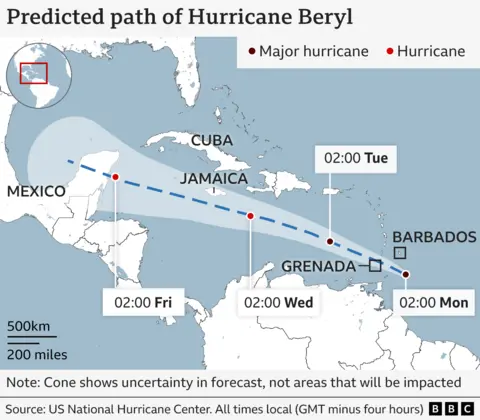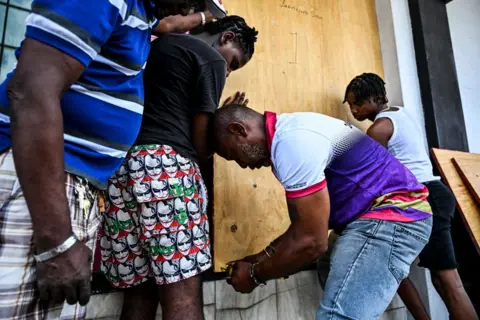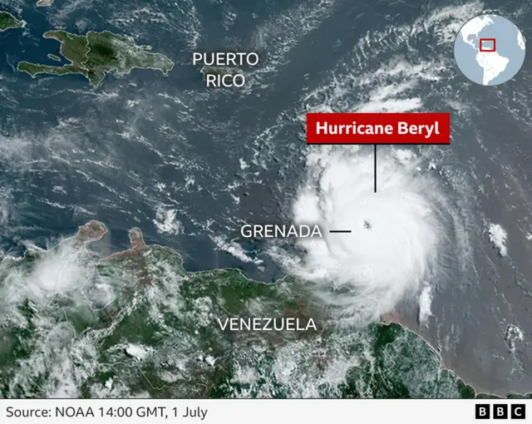Hurricane Beryl has made landfall on Carriacou Island in Grenada, according to the US National Hurricane Center (NHC).
The hurricane, which has regained strength in the past hours, has sparked warnings of life-threatening winds and dangerous storm surges.
"In half an hour, Carriacou was flattened," according to Grenada Prime Minister Dickon Mitchell.
A hurricane warning is also in effect in Barbados, St Vincent and the Grenadines, and Tobago.
Earlier, airports and businesses shut down and residents across the Caribbean were urged to seek shelter as the potentially devastating storm hit the region.
Dozens of flights were cancelled across the region as Beryl approached on Sunday night, while leaders urged the public to heed warnings.

'We are not yet out of the woods'
In a news briefing on Monday, Mr Mitchell warned: "We are not yet out of the woods." Grenada has also experienced several power outages, impacting communications and access to government updates.
Maximum sustained winds for the hurricane are near 150mph (241 km/h), according to the NHC's latest update, as the storm moves west.
A hurricane watch is in effect for Jamaica, which means the region is likely to experience hurricane conditions by Wednesday.
"It is not a joke," said the prime minister of St Vincent and the Grenadines, Ralph Gonsalves, reminding people of the devastation caused by past hurricanes in the Caribbean.
In a national address from his official residence, Mr Gonsalves said he was seeking shelter in his basement.
"The roof, certainly the old part of the roof, may not survive winds at 150mph. I am making preparations to go downstairs," he said.
The hurricane was upgraded to a category four on Monday after slightly weakening earlier.
The NHC said fluctuations in strength were likely to continue but warned that portions of the Windward islands should prepare for "potentially catastrophic wind damage".
It said St Vincent and the Grenadines as well as Grenada were at the highest risk of damage.
Hurricane shelters opened at 18:00 local time (22:00 GMT) on Sunday.

The US National Oceanic and Atmospheric Administration (NOAA) has warned that the North Atlantic could get as many as seven major hurricanes this year - up from the average three in a season.
It said record high sea surface temperatures were partly to blame.
Meteorologists have also remarked on how quickly Beryl developed.
The storm strengthened from a tropical depression into a major hurricane - category three or above - in only 42 hours, hurricane expert Sam Lillo told Associated Press news agency.
Much of the region has heeded the warnings.
Shops have closed and people have stocked up on fuel and groceries.
Grenada issued a state of emergency and St Lucia imposed a "national shutdown", ordering schools and businesses to remain closed.
'We had to literally run away from our studio'
As Hurricane Beryl came barrelling towards St Vincent and the Grenadines, journalists Colvin Harry and Dionne John were running a live radio programme on the country’s National Broadcasting Corporation.
As they discussed the storm’s approach – informing the public of the latest developments, urging people to remain indoors and to heed the warnings of the authorities – their livestream showed the winds picking up quickly in the capital, Kingstown.
After about an hour of the broadcast, the roof of a neighbouring building came crashing down and they had to take shelter in nearby home to ride out the storm.
“We’re going to have to take a break as we assess our own safety here”, said Colvin with typical unstated calm on air.
“We had to literally run away from our studio”, he told the BBC after the broadcast via WhatsApp messages. “We’re safe in a temporary facility but from what we’re hearing countless number of roofs have gone. Churches, public buildings, schools have all lost their roofs.”
“It’s really bad, we’ve taken a hard hit,” he added.
Record-breaking hurricane
St Vincent and the Grenadines is just one of the Caribbean nations in the path of the hurricane which intensified to a Category 4 storm in a matter of hours.
In fact, Hurricane Beryl has shattered several records in that regard.
The speed with which it strengthened from a tropical depression into a Category 4 storm is unprecedented this early in the hurricane season and Beryl is now considered the earliest Category 4 storm on record.
In fact, only six other hurricanes have intensified as much in under 48 hours in Atlantic hurricane history.
Storms that strengthen rapidly can catch people off-guard and while the governments and the populations of the region have a lot of experience in preparing for and dealing with hurricanes, ample warning is a critical factor in keeping people safe.
Warming ocean temperatures, caused by human activity, are making these storms more frequent and more powerful. Storms like Beryl have the potential to wreak havoc in the region bringing sustained winds, dangerous gusts and large amounts of rain onto the Caribbean islands.
Low-lying coastal regions are also at risk of storm surges and flash flooding while mountain regions can experience landslides, especially when rain is dumped on already wet ground.

In this instance, it does seem that, despite the limited warning, many residents in the path of the storm had enough time to at least gather the basics. Lines of people formed at petrol stations and hardware stores in St Vincent and the Grenadines and in Grenada – another island likely to feel the worst of Beryl. Thousands of homes have been boarded up and there is still some hope that a combination of experience and emergency procedures will have helped to save lives.
However, with storms are as powerful as this one, sometimes all the warning in the world isn’t enough.
A particularly bad hurricane season in 2017 saw Hurricane Irma wreak devastation in much of the Caribbean, only to be followed just weeks later by Hurricane Maria which caused extensive damage in Puerto Rico.
Given that the official alerts in the case of Beryl will have been late in comparison to other hurricanes, it’s very possible that some communities will have been caught on the back foot. Whether that be homeowners failing to tie down infrastructure that can turn into projectiles or some communities not having appreciated the gravity of the storm, the potential for the loss of life from Beryl is self-evident.
At this stage, communications to some smaller islands of Grenada, like Carriacou and Petit Martinique, have been knocked out. Even for the governments at this stage, it’s simply a question of waiting out the storm to then assess the extent of the damage.
For now, Beryl is the immediate concern of several nations who have already felt its effects and other islands who are still waiting for it to pass.
Yet none of this situation bodes well for the rest of the Atlantic hurricane season. Forecasters and climate experts predict this will be a particularly busy and intense year in which Hurricane Beryl has set the tone from the start.
Latest Stories
-
Immigration judge says Columbia University student Mahmoud Khalil can be deported
2 hours -
Kenya: Opposition tells Prez Ruto- You are no Kibaki
2 hours -
Uganda and Zimbabwe open Rugby Africa Women’s Cup Division One with wins
3 hours -
Why Salah turned down ‘£500m Saudi move’ for Liverpool stay
3 hours -
I died, went to heaven but God sent me back – Actress Doris Ogala
3 hours -
‘I am not intimidated’ – Rev. Ntim Fordjour breaks silence after botched arrest attempt
3 hours -
NPP will be better if the ‘demons’ are evicted from the party – Prof Frimpong-Boateng
4 hours -
Maison Yusif Fragrance makes history with ‘The Apex’ – Africa’s best selling niche fragrance
5 hours -
Braye hits hat-trick as Medeama beats Dreams FC 4-0
6 hours -
Electricity tariffs up by 14.75%, water by 4.02% in latest review
6 hours -
Francophonie Festival 2025: A celebration of education and culture
6 hours -
Most Ghanaians are like single-phased wires -Prof. Akosa
7 hours -
GUBA leads historic Memphis-Ghana Trade Mission, paving the way for diaspora investment
7 hours -
KNUST declares 2 former students persona non grata over indiscipline, campus disturbances
7 hours -
IGP clarifies comments on recruitment of Bawku youth into the police service
7 hours

